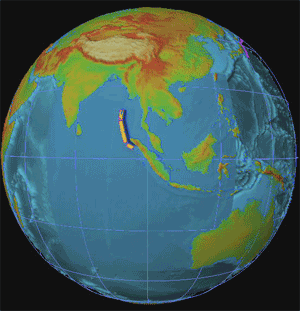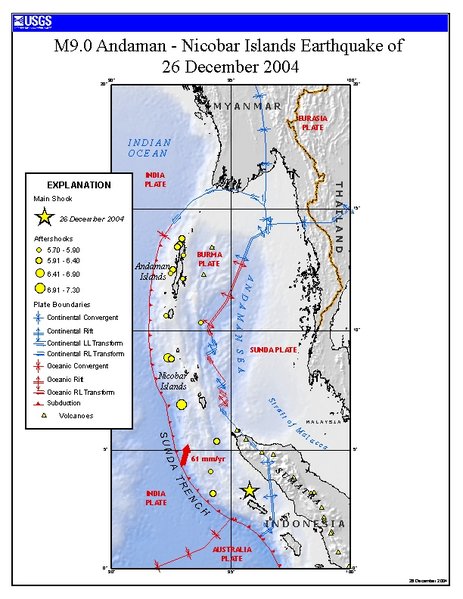Instructor: Dr. Chris Cirmo, Geology Department (http://web.cortland.edu/cirmoc/index.htm)
Image and Interpretation of the December 2004 Indian Ocean Tsunami!




Course
Time and Location:
Bowers 339 T,Th 4:25-5:40
Instructor
Office Hours:
·
Monday:
11am-12:45pm
·
Tuesday:
2-4:15pm,5:45-7pm
·
Wednesday:
11:15am-1pm
·
Thursday:
2-4:15pm,5:45-7pm
Email
list and web site: The
website for the course is
found on my home page list
Course
Description and Rationale:
With oceans of water covering over
70% of the earth’s surface, it behooves all natural scientists and
future
elementary (childhood
The
goal of this course is to introduce the student to the
current state of knowl
Textbooks
and Other Resources
·
An
Introduction to the World's Oceans. Duxbury, Duxbury and
Sverdrup. (2002). 9th
·
Other
readings, books, articles and websites as assign
·
Course
Web-Site: I will post news items, changes in the
syllabus, assignments and due dates, etc. on the course web site which
is found
by going to the web site above and clicking on the hyperlink for
Physical
Oceanography, GLY 397. You should
check this website daily for any changes.
Evaluations:
·
Three
(3) Lecture Exams,
the last one
given during finals week. (Exam 1 = 20%, Exam 2 = 20%, Exam 3
= 25% of
the course grade).
·
Bi-weekly
Quizzes.
The
quizzes
will consist of questions from the text, pos
·
Assignments:
Most
assignments will not be collect
·
A
10-minute PP presentation on a topic in
Oceanography.
These will be assign
Attendance:
For this course, attendance is expect
Student Conduct:
Students are expect
Lecture
Topics:
(SPECIFIC
LECTURE TOPICS WILL BE CONTINUALLY POSTED
(This is not an
exhaustive list)
- History of Oceanography and Ocean Discovery
- Units of Measurement in Oceanography, Scientific Notation and the
Language of
Science
- Plate Tectonics and the Ocean Basins
- Seawater Chemistry and Physics
- The Atmosphere/Ocean Linkage and Current Ocean Exploration
- Ocean Currents and Tides
- Climate and the Oceans - El Nino, La Nina and
- Ocean Exploration and Field Trip to Woods Hole Oceanographic
Institution
- Coastal Wave Dynamics, Sea Level Rise and Oceanic Coastal Zone
Problems
- River/Ocean Interactions = Estuaries
- Plankton, Nekton and Benthos- Biological Controls on Chemistry and
Climate
COURSE
OBJECTIVES:
By the end of the
course, students should be able to:
·
Critically
Evaluate a Scientific Topic on Oceanography and Defend
Your Views in class
·
Describe
the overall world hydrologic budget and the role of the
oceans in that budget
·
Perform
unit conversions, scientific notation, and the know the "language"
of science
·
Understand
how the plate tectonic theory defines the current
geography of ocean basin
·
Explain
how the chemistry of water is responsible for its physical
properties
·
List
the factors which control the salinity conditions in the
oceans
·
Explain
why ocean water circulation is controll
·
Explain
how the atmosphere affects ocean circulation and ocean
chemistry
·
List
the factors which lead to the production of ocean currents
and tides
·
Discuss
the El Nino and
·
Discuss
how waves are form
·
List
the types of coastlines and relate this to their history of
ocean or terrestrial control
·
List
and describe the types of estuaries and how this reflects
their source of freshwater
·
Discuss
the phenomenon of coral reef bleaching and hypotheses as
to its cause.
·
Understand
the role the oceans play in “climate change phenomena”
Disability
Policy at SUNY Cortland:
If
you are a
student with a disability and wish to request accommodations, please
contact
the Office of Student Disability Services locat